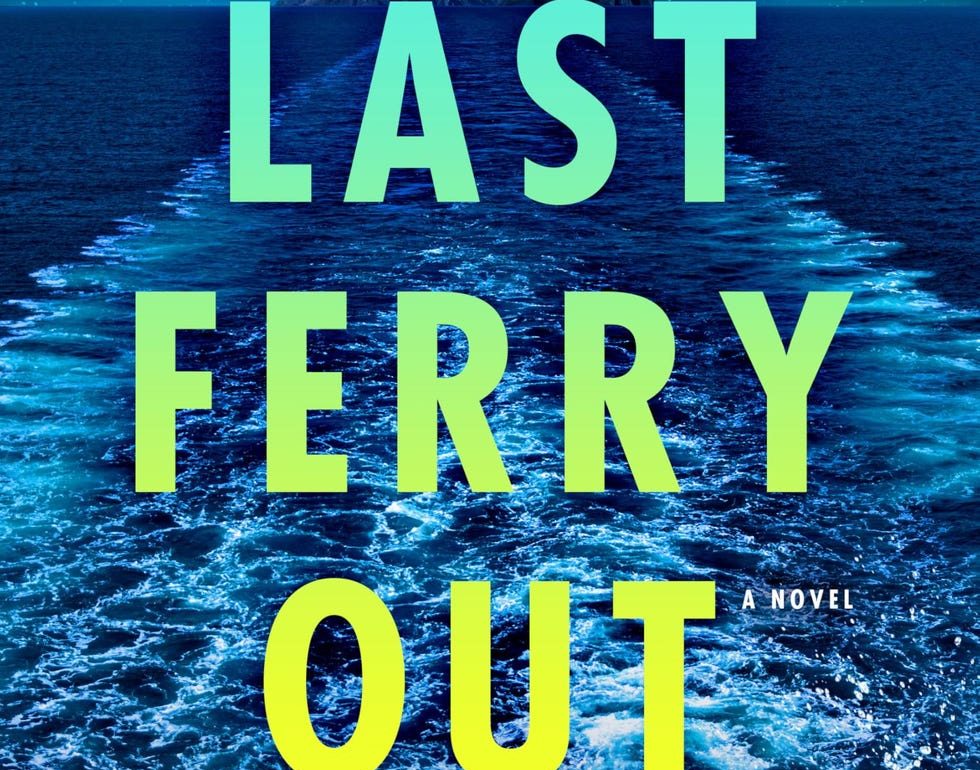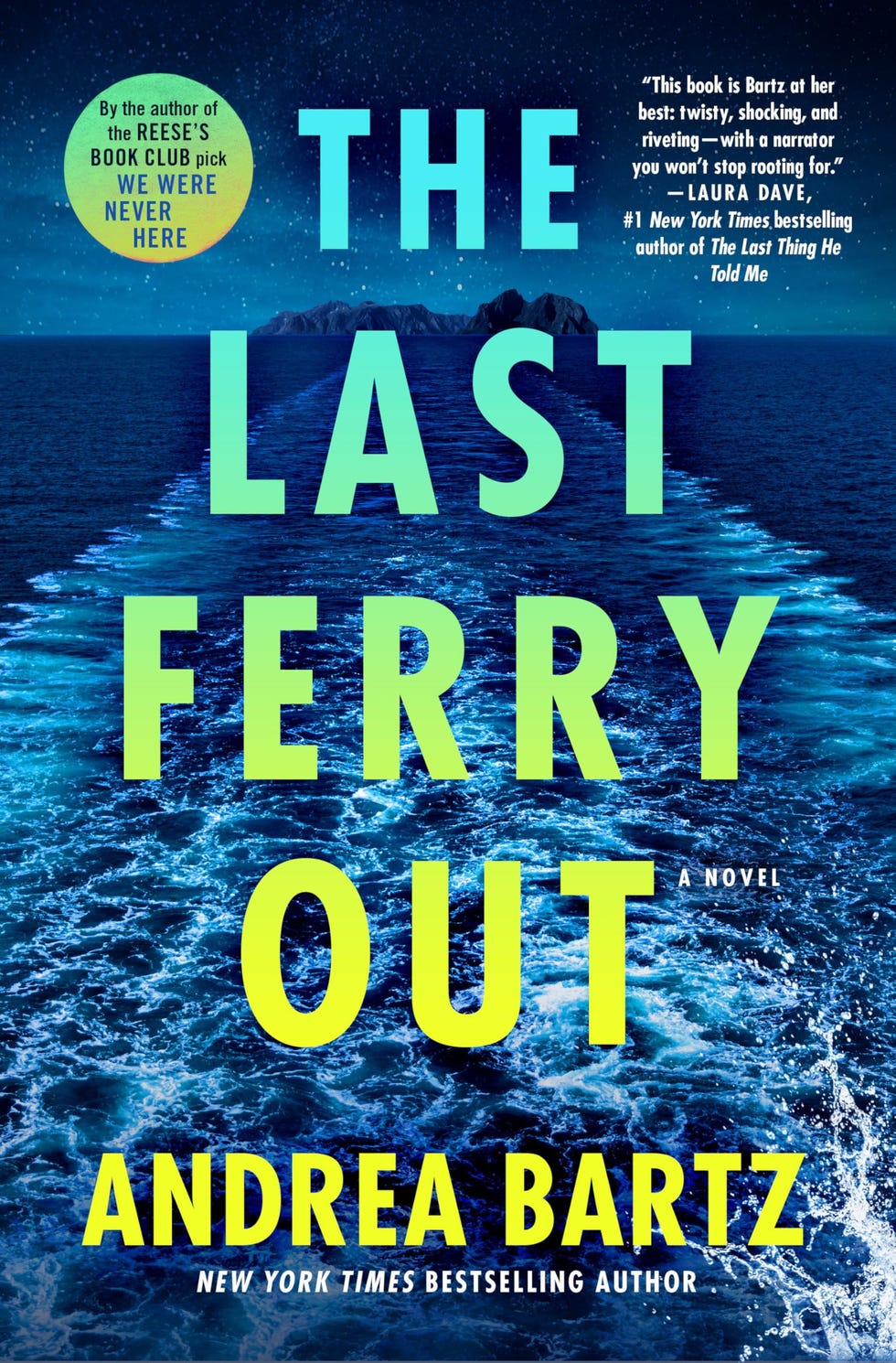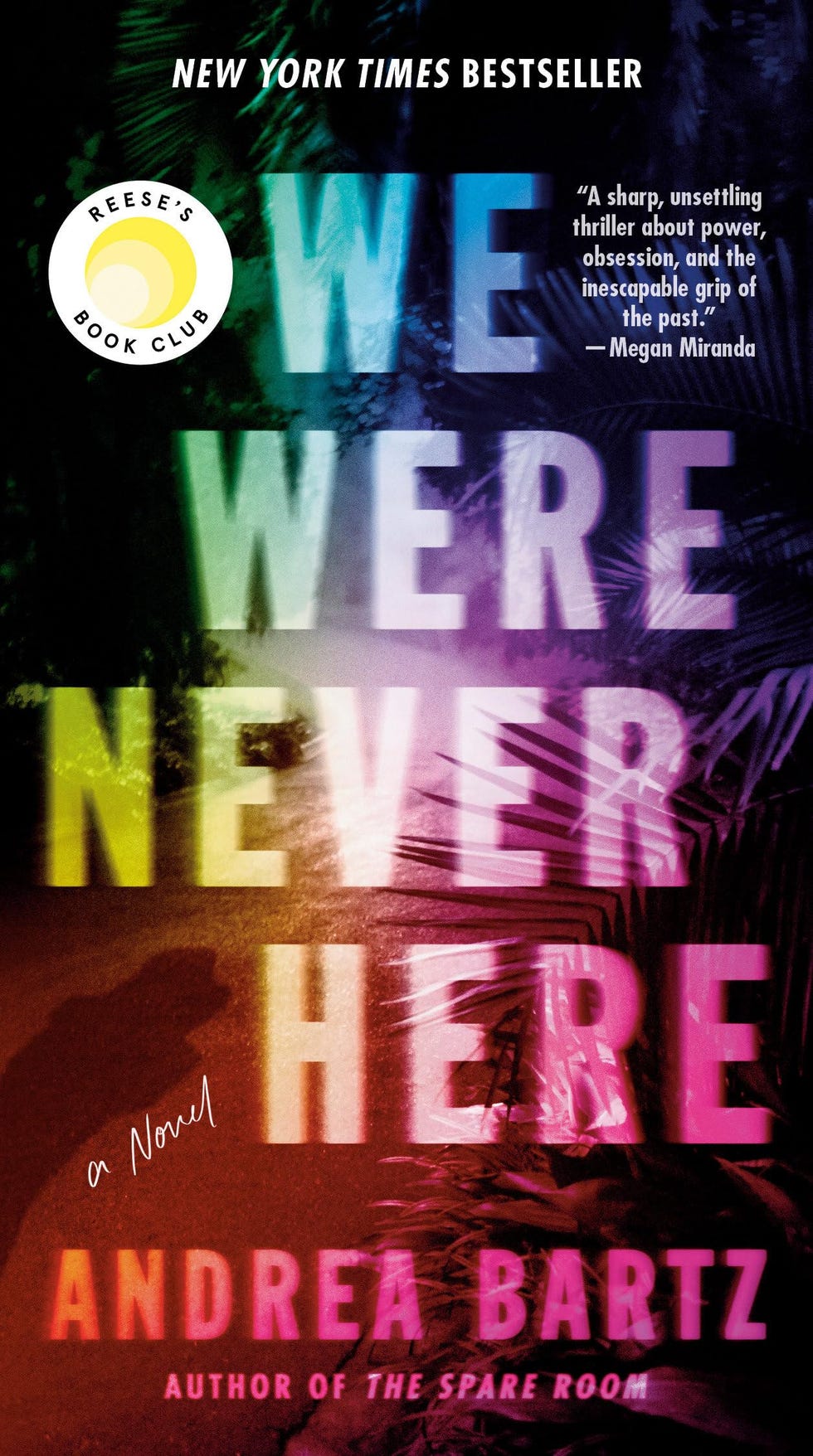Andrea Bartz hasn’t “made it.” Not yet. She doubts she ever will. Her latest thriller, The Last Ferry Out, is her fifth book in six years—now part of a list that includes the New York Times bestseller and 2021 Reese’s Book Club pick We Were Never Here—and she’s enormously grateful for the success and ongoing longevity of her writing career. But she also acknowledges that “the goalposts,” as she puts it, never stop shifting. “You could see that as, I don’t know, depressing,” she says. “But I really think it’s freeing. It’s empowering to know that, like any other career, a writing life is going to be a marathon, not a sprint.”
These nuggets of literary wisdom spring up naturally in conversations with Bartz, who’s used her penchant for advice to drive readers to her Substack newsletter, Get It Write, as well as her own books. A decade ago, she was a magazine editor for publications including Glamour and Psychology Today, but after one too many outlets folding and journalists laid off, she realized she needed “some project where I can’t go into work on a random Tuesday and find out it’s been taken away from me.” A book would be hers. She “got serious” about the draft that would become her debut novel, The Lost Night, and balanced freelance journalism with fiction writing as her book sales slowly supplied greater and greater percentages of her income.
Now, she considers herself a full-time author who conducts a “little freelancing on the side.” But she’s never once forsworn the tap-dancing mentality journalism taught her. She’s currently writing for the screen; working on her next novel; and running her Substack, which has grown into an author community she adores. “As the world feels scarier and scarier, and we feel—or, at least, I feel—more cut off from other people, we don’t have the same community building that we had generations ago,” Bartz says. “So, finding literary community, especially online, is necessary for surviving long-term in this industry and not feeling so lonely or so frustrated or so gaslit.”
The Last Ferry Out is a classic vacation thriller, set on a gorgeous (fictional) island where Bartz’s protagonist, Abby, has arrived to learn more about the final days of her fiancée, Eszter, who died of an allergic reaction on the island. But as she seeks closure, Abby instead learns that the circumstances around Eszter’s death were unusual—and, perhaps, malicious. As Bartz has promoted the book both in-person and online, she has repeatedly underscored that even an “escapist” thriller like her own can have a wide-reaching and ambitious impact. As she wrote to her Substack followers this week, “Let’s make this book a hit and show publishers that queer stories are worth investing in!”
Ahead, Bartz discusses the origin story behind her latest suspense; the politics and pleasures of the thriller genre writ large; how authors should build communities online; and the benefits of “radical candor” with her readers. “So many people have helped me get where I am,” she says, “so I am constantly keeping an ear and an eye open, asking, ‘How can I show up for this community? How can I be someone who is a net good [in the publishing industry], who’s helping other people?’”
The idea for The Last Ferry Out came from a trip that you took to Mexico in 2020, correct?
Yes. In February 2020—before I knew that that was epically lucky timing—I spent a month traveling solo around Mexico. And everywhere that I went, I met these really lovely welcoming expats, these close-knit communities who swept me in, welcoming me into their ranks while I was there. I went salsa dancing with some of them and I did beach bonfires with other ones.
I really liked all these people, and I was sort of jealous of them, because here they are living in paradise full-time, and I was like, “What’s going on? All they have in common is that they parachuted out of their normal lives?” And that got me thinking: What are they running away from, and/or what are they seeking? Would these people even be friends if it weren’t for the fact they all speak English?
The mind of a thriller writer always churns, so I love trying to capture close-knit, closed-door social milieu. So with that little knot of expats, I thought, “Okay, what if we took that group and we threw a dead body into the center?” Which is what I always do. And that gave me the idea for The Last Ferry Out, which is about a woman traveling to the island where her fiancée died in an accident a few months earlier, meeting these enchanting expats there, but the more she digs, the more she begins to suspect that maybe it was not an accident at all, and she might actually be trapped on an island with her fiancée’s killer.
I want to talk about this idea of expats “parachuting in,” wanting to “preserve” or “revitalize” a community that might or might not be theirs to claim. How did you poke at such a complex issue as you were working on this manuscript?
When I’m working on a manuscript, I need to have some kind of swirling energy force at the center of it that’s a question I don’t know the answer to, or I don’t know exactly how I feel about it yet. Expats were such a great example because I was envious of them, but do I think their lifestyle is unethical? Is there something weird about the ownership that they claim to have over a place and the sort of disdain they have for tourists when they are long-term tourists, in a sense? The question of who owns a place is so interesting. And I knew that I was going to figure out how I felt about it via my narrators and them interacting with this island and with the community there, both the locals and the expats.
Eszter, the woman who died on the island, is first-generation; her parents are Hungarian. And that was partially based on my own life. My grandparents are Hungarian; they were immigrants. They brought my mom over when she was young, and they have immense pride in the U.S. They very much care about being the “good” kind of immigrants, and they feel this very strong sense of American pride. But, also, nobody ever called them expats. They are immigrants. I wanted to introduce those elements as well and think about how they would affect Eszter’s thinking about this group of people who have made this beautiful island their playground—but also they do have a genuine affection for it.
I don’t know that I came to any big conclusive answers by the end, but it was fun for me to explore what it means to call a place home.
As so many authors and readers have put forth—in the past few months, especially—“escapist” books are still political. With that in mind, how do you think about your “political” approach as a thriller author?
I think all art is political. I think if it weren’t, then there wouldn’t be forces working as hard as they are right now to silence artists in different ways and to ban books and to keep people from considering other things. I think, especially for fiction, when you read a novel, you are stepping into the shoes of another character, by definition. You are forced to be in an empathetic experience for eight hours or however long it takes you to read the book. And I think that’s such a mind-blowing privilege that we authors have, where we are up in people’s imaginations. Imagination is where we can dream about things being different, and we can envision a better world, and we can question deeply held beliefs. It’s just so powerful and incredible to me that I get to create these worlds that are fun and exciting to read, but then also can hopefully make people—whether they realize it or not—think about things differently.
A really surface-level example: This is a queer thriller, but it’s not about queerness. So if somebody doesn’t have any friends or doesn’t have personal experiences with women who are in relationships with women like myself, now you do. You have me! And you have this story, these fictional characters, and you can see it’s just like any other relationship.
I think of my books as having an obligation to bring into the light elements of the female and non-male experience that are not something we like to look at or talk about as a society. Across all my books, I have women sharing their shame, their guilt, their anger, how they’re biting it back, how they’re keeping it in, embarrassment about ways that they’re not meeting societal norms or being the person that society has told them that they should be. We as women are way more angry than we are allowed to feel and express. So let’s talk about it. It’s not just you. There’s nothing wrong with you. So that’s an element that, as I’m writing, I’m challenging myself not to hold back. If I ever start to feel like, “Oh my gosh, this is too personal. This is too much. I don’t know if I can do this.” That’s when I’m like, “You absolutely need. You are onto something real and deep, and that’s the goal.”
What, in your opinion, is the pleasure of a thriller novel in a world that already feels so unpredictable?
We women feel scared a lot of the time. Maybe all people feel scared a lot of the time. So there’s something really soothing in choosing to dive into a world where the fear is the reason you’re there, but you know, as a reader, it will be fine. You can close the book when it’s done.
I have a lot of anxious tendencies, and so I joke about how I’ll be in a totally normal, neutral situation with friends, and I’ll be the creepy one who’s like, “Wouldn’t it be weird if in that window over there we saw…” and just whatever terrifying premise for a thriller pops out of my mouth. There is some empowerment and agency in, for me, writing—and, for many people, reading—these fictional experiences of, What would you do? How would you get yourself out? How would you cope? How would you take charge of a situation by becoming a detective or an amateur detective who’s trying to investigate and put all the pieces together?
Even as the world gets increasingly scary, it’s nice for us to drop into these controlled worlds where we are in charge of the adrenaline, we’re the ones deciding to indulge in the cortisol, and we’re doing it for pleasure—instead of doing it because it’s forced on us by the headlines every day.
I want to switch gears and ask about literary citizenship, and particularly the author and reader community you’ve built on Substack. Walk me through the origin story of that platform.
I had a newsletter that was a very ugly thing that I made on Mailchimp, and I hated doing it. I begrudgingly did it because people had told me, “You need to have an author newsletter. That’s the best way to maintain your community.” And so I did it when I had to, but I really dreaded it.
Then I discovered that the algorithm had changed on Instagram and TikTok and nobody was seeing anything anymore. My follower count had gotten fairly healthy, and yet only 2 to 300 people were actually seeing anything that I did. I had discovered from playing around on Reels and on TikTok that what people liked most was the behind-the-scenes author stuff; the candid, unfiltered author life; the advice for craft and for publishing and for getting an agent. At the same time, I was wanting to pull away from freelance writing and was constantly having ideas and having to wait to go through an editor and get someone to approve something.
And I thought, “Okay, a Substack is basically a blog. What if I started a blog that was all the advice I want to give, all the things I want to share, all the realness, all of the calls for community and talking to one another and being in this together? What if I just made some columns that I’m excited about that make sense to me and nobody else has to sign off on it?” So I launched it in, I think, January of 2024.
It’s been really rewarding to work on, and I’ve met a ton of great people through it. There are people who wouldn’t otherwise know about me and my books who, through the Substack, have become what feels like internet friends. It still feels like Substack is one of the good places on the internet. I don’t know if it’s going to change. I don’t know if we’re at the end of the era of it being the good place to go, but right now it feels pretty good.
So anyone who is thinking about taking the leap, I say do it now.
If you could offer only two recommendations to an author who wants to launch a newsletter of their own, what would they be?
Think about something you can offer to the community. Think about something you can do that’s a little different, that ties into your books and ties into your author brand but feels unique.
Relatedly, think about what regular features you can offer, because this is going to make it easier for you to keep coming up with post ideas. Do you want to give recommendations every week? Do you want to corner the market on some kind of niche that has to do with all of your books? Do you want to be sharing news? Do you want to be talking to other people? Because starting from absolute scratch every single time—if you’re determined to post, let’s say, once a week—is going to be really hard.
Finally, pay attention to what people seem to like and what works. Looking at my numbers made me realize that by far the posts that did best for me were the ones when I talked about failure and talked about rejection and talked about being down in the dumps about my career. I was initially nervous to talk about stuff like that, because I thought readers would be like, “Okay, white lady who had a New York Times bestselling book. Enough.” But then I was delighted to learn that that’s what people in this community do want.
You always have to be prepared to shift your strategy while staying true to what you want to communicate as an author.
When we talk about the writing life … you really want to diversify all the things that you’re doing. I’m learning how to write for the screen right now, and my next book is going to be in a slightly different genre; it’s going to be a little more horror. I think anyone who is interested in this career should know your job description is going to keep changing. And, hopefully, that is exciting to you.
This interview has been edited and condensed for clarity.





